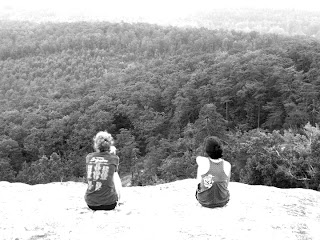Today was difficult. Exhaustingly, frustratingly difficult. The kind of difficult when you close your eyes and try to breathe so that the blood stops rushing to your face but all you can focus on is how the back of your eyelids sting against your corneas. Difficult for embarassingly stupid, annoying, non-reasons. Tiny neutral details that shouldn't stir anyone emotionally really, but just. eat. you. up.
So if you're curious, here's what makes me tick:
There was the fact I could not bring myself to get out of bed today to go to daily Mass, even though everything inside of me burned with a desire for nothing else than just that. So much for willpower.
And realizing I had missed St. Augustine's feast day without saying Morning Prayer or Evening Prayer or Night Prayer or even thinking of him the entire day (this one, in particular, makes little sense to anyone, but please understand that St. Augustine and I are buds. We get each other. One of my sons will be named August. This blog is titled after a passage from his
Confessions. I listen to what he says. This is that terrible, disappointed, guilt that makes you flush in shame when you forget to greet your best friend on her birthday. I do not like it, not one bit.)
And being told that my personality was acidic.
Acidic. Corrosive. Harsh. Astringent. My insides churned as I digested that, almost as if the hydrochloric acid in my stomach was gaining activity after being called upon by name. I punished its hyperactive persistence by not finishing the Greek yogurt I was snacking on.
And losing track of time at coffee with one of your friends and rushing home to discover you've missed family dinner. Perhaps it's because I love everything about mealtime. There is not a better combination than fellowship and food. It is sacramental--nourishing your spirit and body and mind, engaging each one of the five senses. It is the way in which Christ
gets to humanity whenever Mass is celebrated. It has every potential to be beautiful and perfect and more often than not, it is. So when it isn't, loneliness ensues. I'd throw tantrums when being left behind at the dinner table as a child. I was terrifyingly close to throwing one today.
And the way Daddy just passive aggressively stepped over my computer charger a little more loudly than necessary to let me know I'm in his way. Being annoyed at this, and then realizing I'm being just as passive aggresive by blogging about everything that's gotten on my nerves today. This is not why I started a blog. This is why I had not started a blog. I'm failing y'all, dear readers, and yet I have every intention of hitting that Publish button.
And other miscellaneous failings and misgivings that are not worth mentioning to the general public.
And thus, the day ends, and it is my task to figure out why I reacted to today.
Possible Diagnoses:
1. Hormones. Self-explanatory.
2. Stagnophobia. Yes, I just invented a phobia. Yes, that's ok because every other name for a phobia is invented too. But here it is--the fear of staying in one place. Last time there was a lull in adventure, I couldn't take it, and so I started a blog--a cyberadventure, if you will. I thought it would suffice (it did, for two days, before I jetsetted off to Tennessee). I'm now in the middle of a two week adventure lull, waiting for Spanish Semester adventures to begin. Ridiculously restless. My wanderlust rapidly approaches status as a vice. Mother would say "
Ang kati iyong paa mo." ("Your feet are itchy") and Daddy would again call me "
Anak na layas." (Literally, "My child that runs away from home.") I have a problem, I think, and apparentally symptoms of my stagnophobia include irritability, anger, and moodswings. Avoid stagnant Denise as you would avoid stagnant ponds when searching for drinking water.
But for real. Deep breath. Put in things in perspective. Be selfless for like two seconds.
I think it's this:
Pope Benedict XVI describes Christ's agony as "this inability of our hearts to carry within itself simultaneously the love of the most holy Trinity and the love of a world alienated from the Trinity."
There it is.
I have seen beauty and experienced joy and love. I am blessed with more than my feeble frame can handle. I've developed an almost annoyingly facile tendency to see God in maverick places. And when I fail to see Him--when things are not quite as they should be, when I'm uncertain about a decision I've made, when people say the wrong thing at the wrong time to me, and especially when I'm unreconcilably disappointed in the person I've become--I get angry. Things are not perfectly joyful. They have not reached my standard, though they once have. But I love them. I enjoyed that extra three hours of sleep this morning. Yesterday, despite St. Augustine being ignored, was still wonderful. Acidic Denise is still the Denise I've been working hard on fixing. And the grilled fish with peach salsa followed by a slice of cherry pie was delicious, though grudgingly consumed in solitude.
Why. How is it possible that I have multiple standards of happiness that do not even come close to matching up? Am I a real person?
Close eyes. Ignore stinging corneas. Exhale. Inhale.
Phone buzzes. Text message from friend.
"How are you, m'dear?"
Oh. Found Him.
I will now hang my head in shame.



















